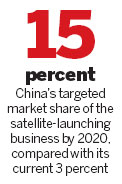Chinese seek greater share of satellite market
Updated: 2013-06-20 11:02
By Li Xiang in Paris (China Daily)
|
||||||||

China is actively exploring commercial opportunities to boost its share of the global satellite-launching market, in an attempt to challenge US and European dominance of this field.
China Great Wall Industry Corp, a subsidiary of China Aerospace Science and Technology Corp, is using this year's Paris Air Show to showcase its next generation of heavy-lifting rocket, the Long March 5, which is expected to be first launched in 2015.
China Great Wall, the country's sole commercial provider of international launch services and satellite in-orbit delivery, is also using the event to demonstrate its Long March family of rockets, communication satellite platforms, and remote-sensing and meteorological satellites in the hope of attracting more potential international business, said Zhou Yuanying, the deputy general manager of the company's launch service division.
China launched 19 satellites last year, more than the US did for the first time.
The country aims to increase its market share in the global satellite-launching business to 15 percent by 2020, according to report of Xinhua News Agency. It currently has about 3 percent market share and its main clients are countries from Asia, Latin American and Africa.
Since 2005, China has launched satellites for Nigeria, Venezuela, and Pakistan, and in April added Turkey, Argentina and Ecuador to its international roll call of clients, after sending three more satellites into orbit.
Zhou said that China is basing its offering on a combination of high reliability and reasonable cost, but she admitted that it faces major obstacles in entering the US and European markets.
The US, for instance, has banned the export and transfer of satellites to China as well as the launching of satellites with US components in China, and analysts say the restrictions have helped reinforce the US' dominance of the sector.
The US generated revenue of $1.9 billion from launching services in 2011, accounting for 39 percent of the global market share, according to a report by the US Satellite Industry Association.
Europe accounted for 25 percent while Russia had 19 percent of the market.
Zhou said China is looking for ways to compensate for the market restrictions by seeking opportunities in satellite leasing and cooperation with the world's leading satellite operators, such as European companies SES SA and Intelsat SA.
China has already leased its commercial satellite Apstar-7 to the US Defense Department for control of the communications of its Africa command, and the Pentagon recently extended a $10.7 million leasing contract with China.
China Great Wall is also promoting the applications of the Beidou satellite navigation system, an alternative to the US Global Positioning System, to international clients.
China plans to invest 7 billion yuan ($1.13 billion) to further develop the system, which began to provide services for clients in the Asia-Pacific region in December 2012, according to media reports. The system is expected to serve global customers in 2020.
lixiang@chinadaily.com.cn
(China Daily USA 06/20/2013 page1)

 Michelle lays roses at site along Berlin Wall
Michelle lays roses at site along Berlin Wall
 Historic space lecture in Tiangong-1 commences
Historic space lecture in Tiangong-1 commences
 'Sopranos' Star James Gandolfini dead at 51
'Sopranos' Star James Gandolfini dead at 51
 UN: Number of refugees hits 18-year high
UN: Number of refugees hits 18-year high
 Slide: Jet exercises from aircraft carrier
Slide: Jet exercises from aircraft carrier
 Talks establish fishery hotline
Talks establish fishery hotline
 Foreign buyers eye Chinese drones
Foreign buyers eye Chinese drones
 UN chief hails China's peacekeepers
UN chief hails China's peacekeepers
Most Viewed
Editor's Picks

|

|

|

|

|

|
Today's Top News
Shenzhou X astronaut gives lecture today
US told to reassess duties on Chinese paper
Chinese seek greater share of satellite market
Russia rejects Obama's nuke cut proposal
US immigration bill sees Senate breakthrough
Brazilian cities revoke fare hikes
Moody's warns on China's local govt debt
Air quality in major cities drops in May
US Weekly

|

|








